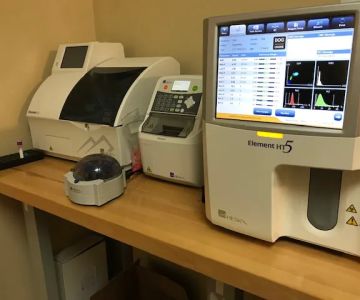What Subjects Are Required to Become a Veterinarian?
- 1. Understanding Veterinary Education
- 2. Core Subjects for Veterinary School
- 3. Advanced Subjects and Specializations
- 4. Real-World Applications: Putting Theory into Practice
- 5. Tips for Success in Veterinary School
1. Understanding Veterinary Education
Becoming a veterinarian requires dedication, passion, and a solid foundation in both science and animal care. If you're considering this rewarding career, it’s essential to understand the academic path and subjects that will prepare you for success in veterinary school. The journey begins with a strong foundation in undergraduate education, followed by specialized veterinary training in graduate school.
The path to becoming a veterinarian can seem challenging, but with the right preparation, it’s entirely achievable. One key aspect of veterinary education is mastering a variety of scientific subjects that lay the groundwork for understanding animal biology, diseases, and medical treatments. Whether you're interested in treating pets, livestock, or exotic animals, these subjects will help you develop the knowledge and skills needed for a successful career.
2. Core Subjects for Veterinary School
As a future veterinarian, there are several core subjects you must focus on during your undergraduate studies to be prepared for veterinary school. These subjects provide the essential knowledge you’ll need to thrive in your medical training. While veterinary programs may vary slightly between schools, most require a solid foundation in the following subjects:
2.1. Biology
Biology is perhaps the most fundamental subject you’ll study. This field is crucial for understanding the intricacies of animal life, from cellular processes to ecosystems. As a veterinarian, you'll need to understand how living organisms function at both the macro and micro levels. Whether it’s learning about animal physiology or genetics, biology is the cornerstone of your education.
2.2. Chemistry
Chemistry plays a critical role in veterinary medicine, especially in the understanding of drug interactions, medical treatments, and the chemistry of bodily functions. Organic and inorganic chemistry are essential subjects that prepare you to understand biochemical processes in animals and how to properly administer medications. A strong grasp of chemistry ensures you are able to handle various veterinary treatments safely and effectively.
2.3. Physics
While it may not be the first subject you associate with veterinary care, physics is integral to understanding how the body functions, from blood circulation to the mechanics of movement. Veterinary students must understand the principles of mechanics, thermodynamics, and light, all of which contribute to a deeper understanding of animal health.
2.4. Mathematics
Mathematics, particularly in the areas of statistics and calculus, is an important subject for veterinarians. Understanding dosage calculations, medical statistics, and diagnostic models is essential for making informed decisions in practice. Whether you are determining the correct dosage of a medication or analyzing lab results, math plays an essential role in veterinary practice.
3. Advanced Subjects and Specializations
Once you complete the core subjects, veterinary school will introduce you to more advanced topics tailored to different areas of veterinary care. These subjects help you specialize and deepen your expertise in specific fields. Specializations may include small animal care, equine medicine, wildlife rehabilitation, or veterinary surgery, among others.
3.1. Animal Anatomy and Physiology
Studying the structure and function of animal bodies is a critical part of veterinary training. Animal anatomy and physiology help you understand how animals’ bodies operate, how they heal, and how to care for them effectively. This subject is a deep dive into how different species’ bodies function and how to tailor treatments based on anatomy.
3.2. Veterinary Pathology
Pathology is the study of diseases, and in veterinary school, it becomes a core subject that teaches you how to diagnose and treat various animal illnesses. Whether you are identifying infectious diseases or understanding how certain diseases affect animals, pathology is fundamental for every veterinarian. It’s an important subject for anyone aiming to work in clinics or hospitals where diagnosing illnesses is a key component of daily work.
3.3. Pharmacology
Understanding how drugs work in animals is crucial for veterinary medicine. Pharmacology deals with the study of drugs and their effects on animals’ bodies. This subject equips you with the knowledge to prescribe the right treatments, understand dosages, and anticipate side effects. It’s especially important for veterinarians who plan to work with various types of medications, from antibiotics to pain management treatments.
3.4. Surgery and Anesthesia
Veterinary surgery is a highly specialized field that requires in-depth knowledge and hands-on practice. Whether it’s performing routine procedures like spaying and neutering or complex surgeries, veterinary students will undergo extensive training in this field. Anesthesia is another crucial component, as understanding how to safely sedate and monitor animals during surgery is paramount.
4. Real-World Applications: Putting Theory into Practice
As with any medical profession, the real-world application of theoretical knowledge is crucial. Veterinary schools provide clinical training and internships that allow students to work with actual animals, refining their skills and applying their knowledge in practical settings. This hands-on experience is vital for developing diagnostic and treatment skills, as well as building confidence in real-world veterinary care.
During my time as a veterinary student, I had the opportunity to work directly with animals in a clinical setting, and it was eye-opening. Theoretical knowledge alone can only get you so far—it’s the practical experience that truly prepares you for a successful career. Whether it’s performing physical exams, assisting with surgeries, or communicating with pet owners, these real-world experiences make a huge difference in shaping your expertise as a veterinarian.
5. Tips for Success in Veterinary School
Veterinary school can be challenging, but with the right approach, you can excel. Here are a few tips I’ve found helpful:
5.1. Stay Organized
Veterinary school involves studying a vast array of subjects and managing multiple responsibilities. Staying organized with your schedule, assignments, and clinical work is essential for success. I found that using a planner or digital calendar helped me keep track of deadlines and exams.
5.2. Build Strong Relationships with Faculty
Faculty members are a valuable resource in veterinary school. Building strong relationships with your professors and mentors can help you gain insight into complex subjects and open doors for research opportunities or career advice.
5.3. Gain Hands-On Experience
Seek out internships, volunteer opportunities, and clinical practice as much as possible. The more hands-on experience you gain, the more confident and skilled you’ll become in the field.











